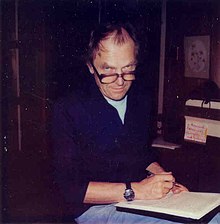Paul Feyerabend
| Paul Feyerabend | |
|---|---|
 |
|
| Born |
January 13, 1924 Vienna, Austria |
| Died | February 11, 1994 (aged 70) Genolier, Vaud, Switzerland |
| Alma mater | London School of Economics |
| Era | 20th-century philosophy |
| Region | Western Philosophy |
| School | Epistemological anarchism |
|
Main interests
|
Philosophy of science, Critiquing Falsificationism, Epistemology, Politics |
|
Notable ideas
|
Epistemological anarchism |
|
Influences
|
|
Paul Karl Feyerabend (German: [ˈfaɪɐˌaːbɛnt]; January 13, 1924 – February 11, 1994) was an Austrian-born philosopher of science best known for his work as a professor of philosophy at the University of California, Berkeley, where he worked for three decades (1958–1989). At various different points in his life, he lived in England, the United States, New Zealand, Italy, Germany, and finally Switzerland. His major works include Against Method (published in 1975), Science in a Free Society (published in 1978) and Farewell to Reason (a collection of papers published in 1987). Feyerabend became famous for his purportedly anarchistic view of science and his rejection of the existence of universal methodological rules. He was an influential figure in the sociology of scientific knowledge. Asteroid (22356) Feyerabend is named in his honour.
Paul Feyerabend was born in 1924 in Vienna, where he attended primary and high school. In this period he got into the habit of frequent reading, developed an interest in theatre, and started singing lessons. After graduating from high school in April 1942 he was drafted into the German Arbeitsdienst. After basic training in Pirmasens, Germany, he was assigned to a unit in Quelern en Bas, near Brest (France). Feyerabend described the work he did during that period as monotonous: "we moved around in the countryside, dug ditches, and filled them up again." After a short leave he joined the army and volunteered for officer school. In his autobiography he writes that he hoped the war would be over by the time he had finished his education as an officer. This turned out not to be the case. From December 1943 on, he served as an officer on the northern part of the Eastern Front, was decorated with an Iron cross, and attained the rank of lieutenant. When the German army started its retreat from the advancing Red Army, Feyerabend was hit by three bullets while directing traffic. One bullet hit him in the spine. As a consequence he needed to walk with a stick for the rest of his life and frequently experienced severe pain. He spent the rest of the war recovering from his wounds.
...
Wikipedia
